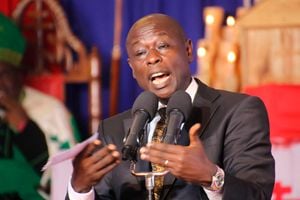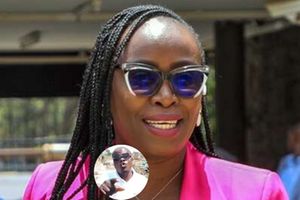Why the weave is here to stay

What you need to know:
- Love it or hate it, Kenyan women are not about to give up their artificial hair extensions. In fact, quite a number spend what many will think is an outrageous amount just to own a perfect mane of hair .
This season on ‘The Tyra Show’, we’re taking it to the next level and getting more real than ever before by encouraging women everywhere to own and rock what they’ve got and be proud!”, begun Tyra Banks during the premier of the fifth season of her talk show.
Tyra had just pranced in minus her signature long, flowing blond extensions to reveal her “real” black hair and for this ‘brave and daring’ move, was rewarded by wild cheering and clapping from an adoring audience.
“I feel like it’s my responsibility to redefine true beauty, so I’ve shown myself with no make-up and now I’m showing my real hair – and it’s all because I want more women to be proud of who they are…inside and out.”
Now, Tyra Banks is considered one of the most influential role models for young women in the US, and no doubt, scores of women went ‘real’ after their idol finally ditched fake hair on day time television.
One thing’s for sure, though, even though the former model has a decent fan base here in Kenya, it is unlikely that those hooked to her show will say good bye to their cherished hair extensions, weaves, wigs or braids any time soon to keep in step with the former model.
You see, Kenyan women just love weaves, thanks to its convenience and versatility – in fact, most of them believe that it is the best thing since sliced bread and nothing anybody says will make them give up shop-bought hair.
They will also tell you that a wig comes in handy during a bad hair day. Just wear it over last month’s cornrows which now look like a badly built nest and you’re good to go.
“I find weaves convenient and easier to manage than natural hair,” says Catherine Ireri, running a hand over the glossy black mane on her head. It could pass for her natural hair were it not a bit too shiny. She reveals that the weave cost her Sh1,500.
She used a further Sh2,000 to pay the hairdresser who attached it. In a month’s time, Catherine will pay her hairdresser another visit to have the weave replaced.
Catherine is among the scores of Kenyan women who have unapologetically embraced synthetic hair – but what she parts with, with every salon visit is too modest an amount compared to what some women are willing to fork out for that perfect hairdo.
Some women part with as much as Sh30,000 for hair extensions that will stay on their heads for only three to five days.
According to Farouk Jannedy, one of the country’s most popular names in hairdressing, these are clients who want nothing but the best and are willing to spend Sh75,000, an equivalent of US$1,000 on a regular basis.
“Some of our clients change their hair style depending on the mood – today, she might be in the mood for short hair, tomorrow she might fancy long hair, and the day after, a different colour to match her outfit,” says Farouk, who has been in the hair dressing business for 32 years.
“For these women, synthetic hair is out of the question, they want human hair, actual hair that looks and feels natural, and this is what we give them,” he continues.
The hair that Farouk is talking about is harvested, (literally) from Asian women’s hair which tends to grow thick and long. It is then treated, packaged and sold to women all over the world. Farouk says that this is the kind of hair that Hollywood stars like Beyonce have on their heads.
It does not come cheap, but as he points out, human hair has a much longer shelve life compared to the synthetic type found in supermarkets and other mass outlets.
Good quality human hair lasts 15 to 20 years, is tangle free and can be straightened, curled, blow-dried and tonged without the danger of burning and can also be coloured or tinted.
If the man in your life is dead set against weaves, he might just mellow a little when he finds out that with ever changing hair technology, he will never have to feel the ‘ridges’ beneath your weave.
“Men don’t like feeling the cornrows on your head because it makes them uncomfortable - they want to touch and feel the scalp, and with human hair, it’s possible to achieve this through various techniques that allow your real hair to blend with the extensions,” adds Farouk, who has found that men are willing to spend more money on their wives’ or girlfriend’s hair if they are assured that they will not be able to tell the difference between their real hair and the attached hair pieces.
Human hair aside, there is no doubt that Kenyan women are big consumers of synthetic hair. Take a walk along any street in major towns and you are likely to spot a shop selling synthetic hair pieces.
The city centre is especially littered with hair extension outlets which are always brimming with women jostling to get their hands on their hair of choice.
In spite of the saturated competition, a leading Australian hair extensions company launched its first African subsidiary in Kenya a week ago, which could be a pointer that the Kenyan market is still hungry for synthetic hair.
Serena de Comarmond, the CEO of Secret Stylist, a wholesale hair extension company based in Melbourne, Australia, agrees that hair extensions enjoy a fairly lucrative market in the country.
“It is a sign that Kenyan women are keen on looking good,” she says.
Serena, who started wearing hair extensions during her teens, reveals that the long, flowing locks framing her face are in fact hair extensions.
“Hair is a major part of what defines a woman and all women who are keen on looking good know that one cannot afford to hold onto the same old hair style – this is where hair extensions come in,” she says, pointing out that the good quality ones should be versatile and long-lasting.
She disagrees with the assertion that Kenyan women who favour hair extensions, (especially the ones that resembles Caucasian hair) lack confidence in their looks.
“On the contrary, these women know what many people are yet to appreciate, that when you look good on the outside, you feel good on the inside too,” she says, and stresses that women have a right to enhance their looks.
“Show me a man who wouldn’t like to be seen with an elegant-looking woman,” she challenges. While conducting her market survey mid this year, Serena says that most Kenyan women were keen on having an African-American Hollywood look.
“We had a focus group of about 45 hairstylists drawn from across the country to help us understand what the Kenya woman is looking for.”
Apparently, celebrity hairstyles most popular with clients include those sported by Jordin Sparks, Jada Pinkett-Smith, Brandy and Michelle Obama.
“Hair, just like clothes, follows a certain trend and changes with the season and there is no reason why women shouldn’t ape a certain style if it suits them,” says Serena.




